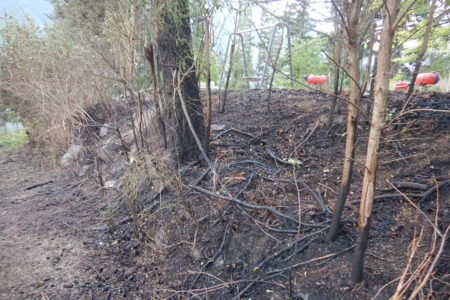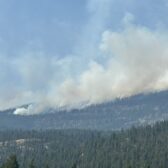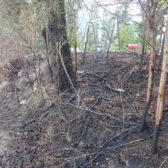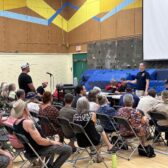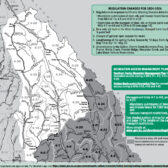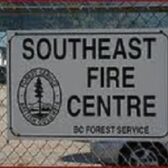Debate over criteria for post-pandemic recovery grant program ripples through council chambers
Call it the COVID-19 re-recovery grant program.
The second phase of the COVID-19 recovery grant program will officially be launched beginning in late January and into February with application intake, followed by Nelson city council review one month later, Nelson city council decided Tuesday night during its first regular meeting of 2023.
For the 2023 version of the grant program a remaining budget of $200,000 will be allocated to the second round of funding, this time with a maximum amount per applicant of $25,000.
“The goal in awarding funds would be to support organizations as they further adapt to permanent changes as a result of the pandemic and to build organizational strength and resilience to ensure their survival and future success,” said city chief financial officer Chris Jury in his report to council.
Although the grant program will not be an ongoing source of support, there was some question as to the timeframe of the economic hardship in question, as well as the use of funds if not as many groups qualified in the second phase.
Coun. Rik Logtenberg wondered if the eligibility for the grant program referred to 50 per cent of lost revenue over the entire pandemic, or just the last half of it.
City manager of Corporate Services, Sarah Winton, said “lost revenue” would include part of 2021 and then into 2022 for the grant.
People “(A)re fully eligible to apply if you received funds in the first round,” she said.
“But we wouldn’t want to double up on any of the granting, counting the same lost revenue twice,” Jury added.
However, Logtenberg was concerned the program’s criteria was too restrictive and it might mean very few Nelson organizations would qualify for the grant.
“It seems to me, especially if we are talking about 50 per cent of revenue, that some non-profits actually did better on the revenue side — grant funded or all sorts of revenue supports — so many organizations would be really disqualified,” he said. “But if we narrow the definition of revenue to ticket sales and then that might put a few, like the Capitol Theatre or the Civic Theatre, into this bucket.”
He also felt the criteria should include 100 per cent of lost revenue instead of 50 per cent.
The Capitol and Civic “(M)ay be the only organizations that really qualify and, given the total amount, we are essentially not spending the money; there will be a lot left over,” he said. “And I think they both need it and could really benefit from it.”
Logtenberg also asked to bump the $25,000 cap to $50,000.
Jury felt Logtenberg’s contentions were more of an issue in the first post-pandemic wave of grants when there were a lot of funds available.
“I totally recognize that a lot of groups did better post-pandemic because they received all of this one-time funding,” he said. “But for the most part I think that has pretty much dried up and we are not seeing those grant funds coming in.”
In the eligibility criteria, the city does ask for organizations to demonstrate a loss of earned revenue, so that would be ticket sales, Jury explained, rather than total revenue.
“As for the $25,000 cap, if you say $50,000, four groups could eat up the whole thing so then it’s not just available to as wide of a group,” he said.
Coun. Leslie Payne liked the broader criteria for the program, however, since there was so much money left over from last year.
“We have this COVID response funding and we know there are entities out there in the community that need the money; we need to give them a vehicle where they can access these funds,” she said.
Mayor Janice Morrison stepped in with a word of caution.
“You do run the risk that four people would meet the criteria and would be asking for the whole ($50,000). So it’s one of those cautionary tales,” she said.
Winton said there was no reason why if the city went with a $25,000 cap and it was not used up that city staff couldn’t come back to council and increase the amount.
“It is easier to increase the amount rather than decrease the amount,” she said.
“What I was anticipating is, given the criteria, a lot of the organizations that would qualify there might only be two. In which case, if we limited it, then we don’t spend the $200,000 we have left and we only distribute $50,000, leaving $150,000 not being put to work when it could really help an organization that really desperately needs it,” Logtenberg re-iterated.
Winton said the issue could be re-opened and brought to council if the funds were not used up when the dust settled on the applicants.
“So if there are not enough applicants to use up the funding, and there are applicants who could use more funding, the money is in the budget,” and would be used, she said.
The criteria for 50 per cent of earned revenue and a $25,000 cap on the amount awarded was passed by council.
Phase one
A first round of the COVID-19 Recovery Grant Program was held in 2021 in order to help non- profit organizations who were significantly impacted financially as a result of the COVID-19 pandemic.
The program was designed to support organizations who saw a decline in revenue as a result of lost participant fees, cancelled community programs and other events.
That round of funding was set up with a total budget of $300,000, and a maximum amount per applicant of $15,000. The program attracted 18 applicants, with nine being awarded funding at various levels, for a total grant of $95,667.
The 2022-2026 Five-Year Financial Plan included a budget of $154,000 for a second round of the recovery program. The city rolled forward the budgeted amount to 2023 with an increase of $50,000, with the total of $200,000 be included in the 2023-2027 Five-Year Financial Plan.
Source: City of Nelson Jan. 17 agenda






